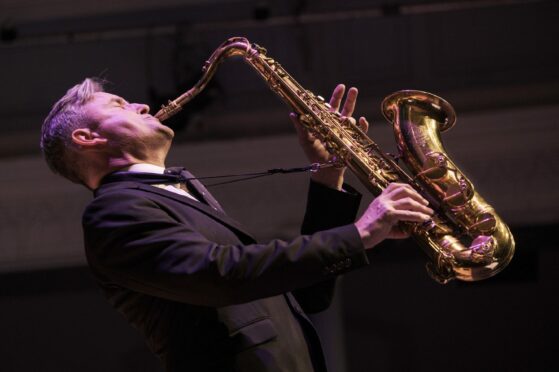
When Tommy Smith met the Queen three years ago to receive his OBE for services to jazz, there was one thing he wanted to ask.
Jazz legend Duke Ellington wrote and recorded a suite after meeting The Queen in 1958, supposedly making only one gold disc which he posted to Buckingham Palace, before destroying the written music.
“You never know what’s true in liner notes,” Smith explained. “The music from The Queen’s Suite had been released after Ellington’s death, by his son, but you read the back story and don’t know if it’s true. So I asked the Queen if she remembered the recording and her eyes lit up, and I could see it was true.”
Smith’s Scottish National Jazz Orchestra (SNJO), which he founded in 1995, will play three pieces from the Suite in concert this week.
“You hear the titles and it’s like a sonic love poem. We are playing The Single Petal Of A Rose, Sunset And The Mockingbird, and Le Sucrier Velours, all very romantic titles. I certainly think he was besotted or charmed by her when they met. To then go and write music, record it and specifically make one copy and forbid it to be released is quite something, but his son Mercer went against his wishes and released it after his death.”
The SNJO has performed some of the music before, including at a concert many years ago for the Prince’s Trust, attended by King Charles.
“The Prince’s Trust gave me money to buy a saxophone as a kid, so I did a free concert and I was talking to Prince Charles about The Queen’s Suite, and he said we have it in our house, maybe we can get someone to put it on cassette for you. I don’t think he realised it had been released by Mercer.”
Smith was a musical prodigy growing up in Edinburgh. He went to college in America when he was 16, thanks to a grant from Sean Connery’s Scottish International Education Trust. The link between the two endured, and Smith played at the former Bond star’s recent private memorial service in Scotland.
“It was a real honour to be asked by his son, Jason. I played the theme from Highlander and My Love Is Like A Red, Red Rose to highlight his philanthropic work,” he said.
As part of a prolific career, Smith set up a jazz school at the Royal Conservatoire of Scotland (RCS) as well as the SNJO and a youth orchestra.
“I had no intention of starting a big band or the full-time jazz course at the RCS, but after touring the world as a young player and seeing what every other country had in place and we had no infrastructure, no jazz orchestra or school, and all the kids were going down to England, and no one was doing anything about it, so I started the school in 2009. One of our students, Ewan Hastie, won the BBC Young Jazz Musician Of The Year last week.
“I set up the youth orchestra because I didn’t like that kids were having to pay to be in big bands with other orchestras, so we made it free but the only way to get in was via talent. A lot of talented players have come through the youth orchestra.”
Smith says Scotland still has a way to go with regards to its jazz infrastructure compared to other countries.
“Scotland is a bit behind. I work a lot in Norway and it has three jazz festivals and six full-time jazz schools across the country. It’s the same size as Scotland but they are doing it much bigger. I feel there’s a lot of potential still out there. We could have more jazz education in other cities, and we could certainly have more jazz festivals, but we need investment and people willing to sacrifice the time to get it started.
“It’s good we give those who are 18 and above the chance to stay in Scotland and study here, whereas before it was an exodus to the five schools in England.”
Scottish National Jazz Orchestra, Queen’s Hall, Edinburgh; Byre Theatre, St Andrews; Glasgow Royal Concert Hall, Thursday to Saturday

Enjoy the convenience of having The Sunday Post delivered as a digital ePaper straight to your smartphone, tablet or computer.
Subscribe for only £5.49 a month and enjoy all the benefits of the printed paper as a digital replica.
Subscribe